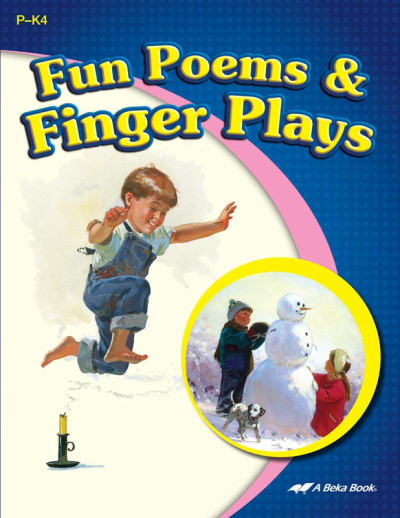We use cookies to make your experience better. To comply with the new e-Privacy directive, we need to ask for your consent to set the cookies. Learn more.
Fun Poems & Fingerplays Book, 2nd Edition
What a fun poem book to use with your littles! Hand motions are written under the lines of the poems to make them even more kid-friendly. A resource filled with nice traditional poems that kids love. Includes 150 different poems. 55 pgs, pb.
Imagination is a huge part of your child's learning. Use his creative mind to its fullest by having him perform short poems. Your child will love acting like a firefighter in the poem "Ten Brave Firefighters" or using hand motions to describe his grandparents. Your child will also learn many poems about animals, plants, holidays, prayer, counting, manners, opposites, history, and community helpers. Preschool–K4.
Language arts programs listed in this section cover most areas of language arts (reading/literature, writing, grammar, spelling and handwriting) in one curriculum, although some skill areas may be covered with less intensity than a focused, stand-alone course.
The Abeka® distinctives start very early and flow through all levels, such as a cursive-first handwriting approach (starts in K and reviewed up to 6), thorough grammar (with diagramming), foundation-based composition skills (begins in 1st grade) and listening/speaking skills (including reading aloud and poetry memorization). All with Christian, patriotic-focused content in a spiral format with detailed teacher instruction. In 1st grade, skills introduced in previous years (phonics/reading, optional cursive, poetry, and vocabulary skills) are enriched with creative writing and sentence-level mechanics, weekly spelling tests, and oral reading. In Grade 2, transition to reading comprehension and beginning literature analysis occurs. Grade 3 begins the four-pronged emphasis of reading skills (analysis & discussion), writing (academic & creative), spelling/poetry, and grammar. Grade 4 (Level A) adds speed reading, the writing process, researching, and diagramming. Students refine all skills in Grade 5 (B), aiming for varied reading and writing (emphasizing research skills), as they head for Grade 6 (C), which cements the elementary skills in preparation for Abeka® upper-level courses.
Abeka materials make it easy for you to encourage learning even with children as young as two. Lesson plans help tie everything together. The easy-to-follow guide includes 40 weekly lesson plans for two-year olds and three-year olds, suggested daily schedules, and ideas for having a fun learning experience.
Two-Year Olds will learn language development and listening skills that include color words, shapes, animals, transportation, countries, community helpers, health, safely, manners, and science.
Three-Year-Olds will recognize the name, sound, and picture for short vowels and consonants. They will practice the formation of vowels and consonants in upper and lower case. Language development and listening skills that include color, words, shapes, animals, transportation, countries, community helpers, health, safety, manners, and science.
| Product Format: | Paperback |
|---|---|
| Brand: | A Beka Book |
| Grade: | PK |
| Length in Inches: | 11 |
| Width in Inches: | 8.5 |
| Height in Inches: | 0.125 |
| Weight in Pounds: | 0.4 |

